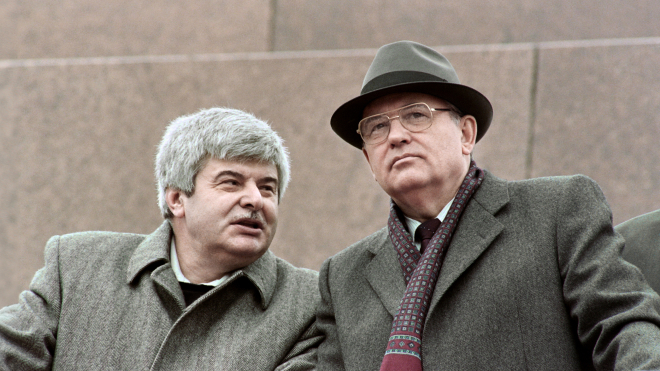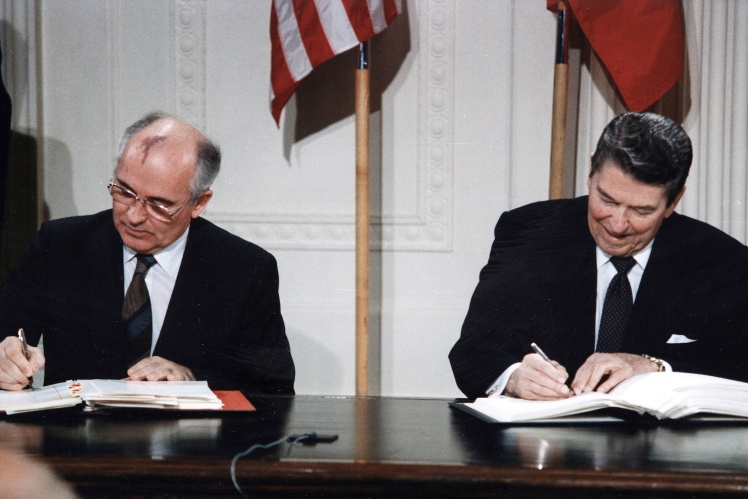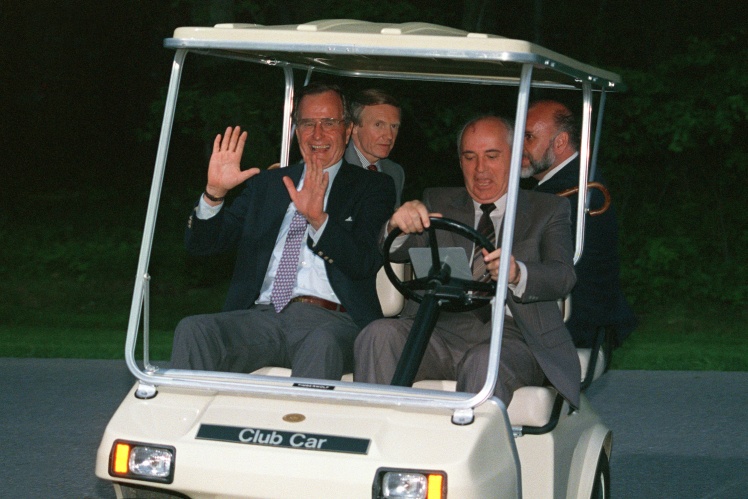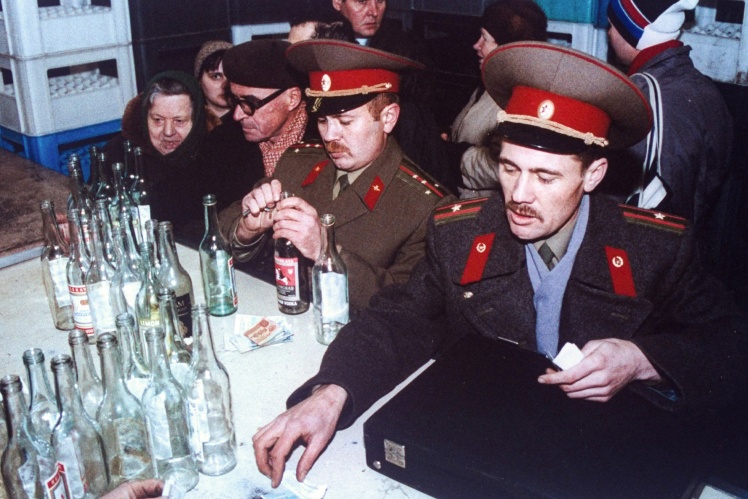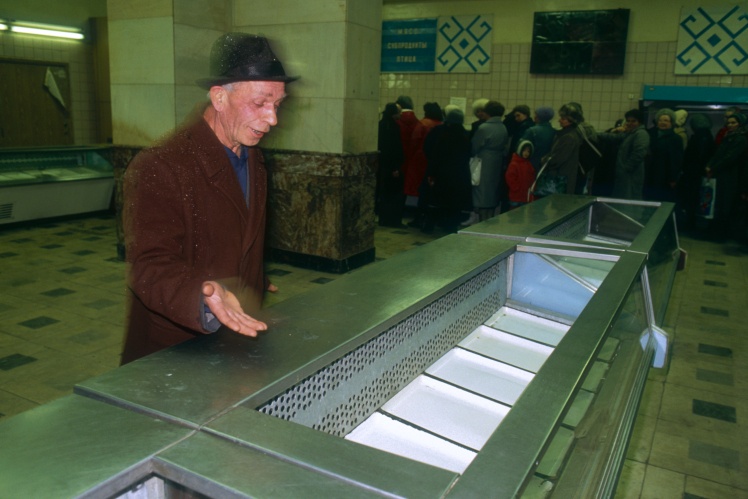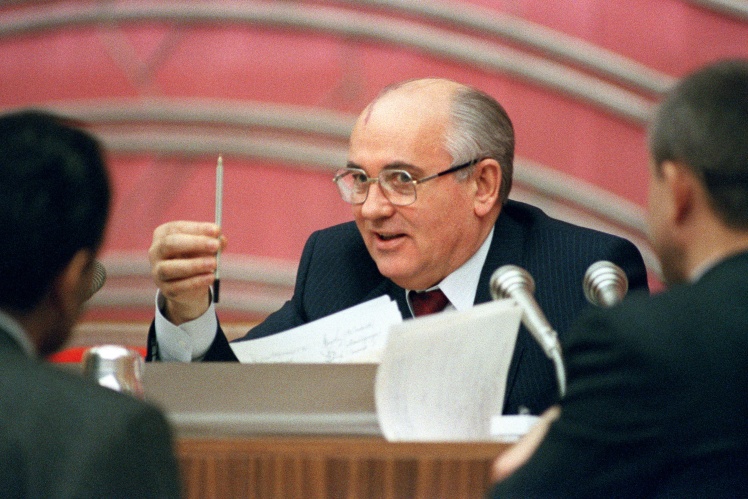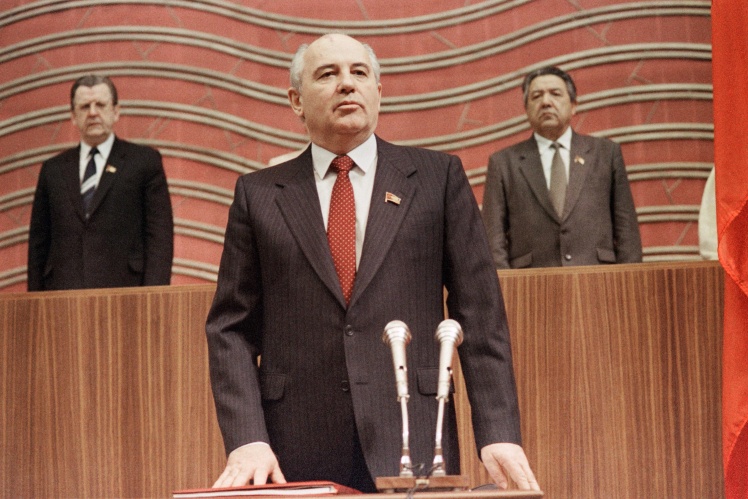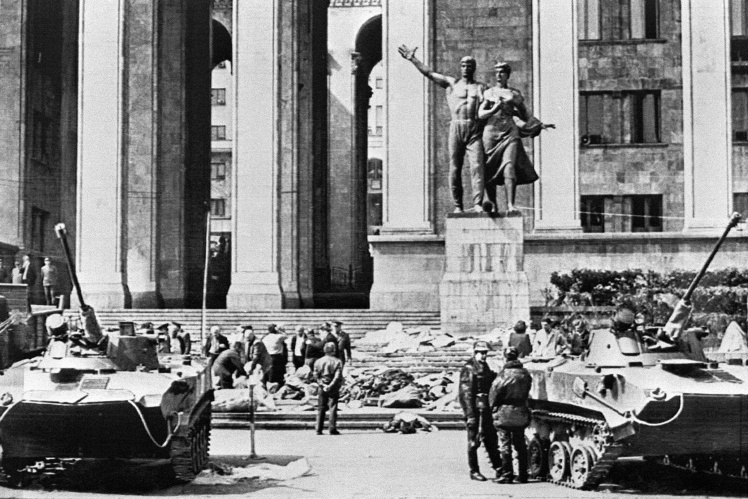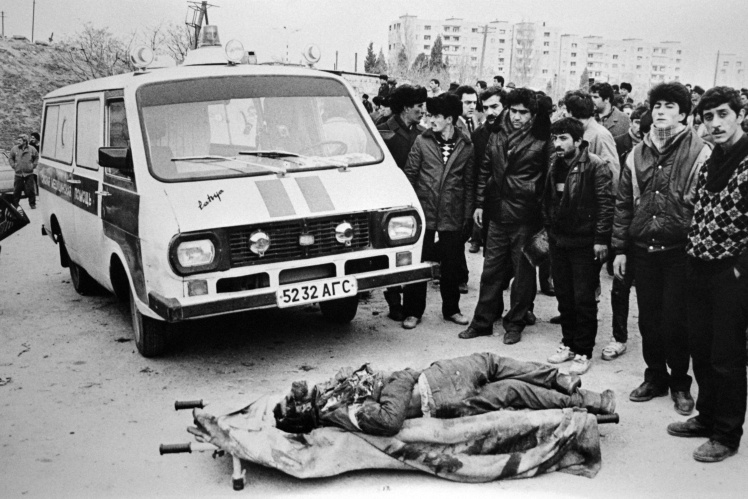In 1985, 54-year-old Mikhail Gorbachev came to power in the USSR. He was called the "young general secretary", because most of his colleagues at the top of the party were at least twenty years older. He tried to introduce radical reforms in all spheres, they went down in history under the name "perestroika".
By the end of the 1980s, Gorbachev had established relations with the West. He negotiated an arms reduction, finally withdrew Soviet troops from Afghanistan, and promised not to interfere in the affairs of socialist countries in Europe. In this way, Gorbachev tried to save money on military and armament expenses. At that time, oil, one of the main sources of income of the Soviet Union, was rapidly becoming cheaper — its price dropped almost three times.
Mikhail Gorbachev and Ronald Reagan sign the Treaty on the Elimination of Intermediate-Range and Shorter-Range Missiles at the White House, December 8, 1987. George W. Bush (left) and Mikhail Gorbachev ride a golf cart at Camp David, the US presidentʼs country residence, on June 2, 1990.
Getty Images / «Babel'»
Such reforms made Gorbachev popular in the West. His meeting with American President George Bush Sr. in early December 1989 was called by the press the end of the Cold War between the USSR and the USA. And Gorbachev himself received the Nobel Peace Prize in October 1990.
On the other hand, after the weakening of Moscowʼs control in Europe in 1989, communist regimes began to fall one after another. Somewhere it happened peacefully, like in Poland or Czechoslovakia. But, for example, in Romania, anti-government protests turned into an armed uprising, which ended with the execution of dictator Nicolae Ceausescu. And finally, the Berlin Wall fell, which for decades was one of the main symbols of the Cold War.
Residents of West Germany demolish sections of the Berlin Wall, November 1989.
Getty Images / «Babel'»
In domestic policy, the perestroika reforms were more controversial, relaxations often alternated with rather strict measures. For example, along with attempts to introduce a market economy, a fight against "non-labor income" was launched. Its main victims were street vendors, as well as collective farm workers and townspeople who grew fruits and vegetables for sale. Another example of strict state centralization was the anti-alcohol campaign of 1985. Eventually, underground moonshine became widespread, drug addiction and drug addiction spread rapidly, and the economy lost tens of billions of rubles.
The economic situation in the USSR was rapidly deteriorating. The countryʼs foreign debt increased from approximately $31 billion in 1985 to more than $70 billion as of 1991. In 1989, hyperinflation and a rapid increase in prices began. Products suddenly disappeared from store shelves. There were long queues at the shops where you could buy anything. That year, food stamps were introduced even in the capital of the state, Moscow — for the first time since the Second World War.
A queue for vodka in a Moscow store, the second half of the 1980s. Empty counters in a Moscow store, November 1990.
Getty Images / «Babel'»
In parallel with the economic crisis, a political one was brewing. The first serious blow to Gorbachevʼs reputation was caused by the Kremlinʼs attempt to silence the real scale of the Chernobyl disaster in 1986. And this is despite statements about openness, democratic freedoms and the absence of censorship. Subsequently, at the end of the 1980s, against the background of the fall of communist regimes in Europe, a "parade of sovereignties" began in the Soviet republics, which threatened the existence of the USSR. Of course, the Kremlin didnʼt like all of this, so the first such attempts in the Baltics and the Caucasus were tried to be suppressed with economic sanctions and force. But protest moods were already spreading even in Moscow.
Rally on Pushkin Square in Moscow, 1990.
Getty Images / «Babel'»
At that time, Gorbachev hastily set about fundamentally reforming the structure of power. At the plenum of the Central Committee of the Communist Party of the Soviet Union in January 1990, he pushed through two revolutionary amendments to the Constitution of the USSR: to cancel the article on the leadership role of the Communist Party and to create a new highest position in the state — the president, who was to be elected by popular vote. The Extraordinary Congress of Peopleʼs Deputies adopted these amendments on March 14, and the next day violated them by electing Gorbachev as president by secret ballot. To tell the truth, at that time Gorbachev was no longer interested in democracy. A few days before that, Lithuania was the first of the republics to announce its withdrawal from the USSR and, of course, would not agree to participate in the elections of the Soviet president.
Mikhail Gorbachev during the debate at the extraordinary congress of peopleʼs deputies in Moscow, March 14, 1990. Gorbachev takes the presidential oath, March 15, 1990.
Getty Images / «Babel'»
The radical actions of the authorities only strengthened radical attitudes in society. Many began to doubt the prospects of democratically influencing the course of events in the country. But Alexandr Shmonov, a 38-year-old locksmith at the Izhorsk plant in Leningrad, decided to go even further — he planned to kill Gorbachev. Shmonov came from an ordinary Soviet family and had a completely average biography: he studied, served in the army, worked, led a quiet lifestyle.
Later, he admitted that his decision was influenced by two events. The first one was dispersal by Soviet paratroopers of an anti-government protest in Tbilisi in April 1989, when twenty protesters were killed in clashes and more than four thousand people were injured. And the second one was the suppression by the troops of opposition demonstrations in Baku in January 1990, as a result of which more than 130 people died.
Military equipment near the parliament building in Tbilisi after the dispersal of demonstrators, April 9, 1989. Killed as a result of clashes with the Soviet army in Baku, January 1990.
Getty Images / «Babel'»
However, Shmonov began by pasting leaflets calling for the overthrow of the Communist Party, as well as anonymous letters with threats, which he sent to the Kremlin. Realizing that no one was paying attention to this, he decided to take a more decisive step and began to plan the murder. He prepared carefully. At first, he calculated that the best chance to get as close as possible to Gorbachev was the parade on Red Square in Moscow on the occasion of the anniversary of the Bolshevik coup. Shmonov bought a double-barreled hunting rifle and special cartridges that can be used to kill an elk or a wild boar with one shot. He sawed off the butt so that it could fit under the cloak. He practiced getting it quickly and regained his shooting skills — even in the army he was famous for good accuracy.
On the day of the demonstration, November 7, 1990, Shmonov put on a fake mustache and wig, grabbed a poster on a metal stand in case he was checked by metal detectors, and went to Red Square. He put a note in his trouser pocket where he admitted that he "wanted to try to kill the President of the USSR Gorbachev." Shmonov was sure that he would be shot during an assassination attempt.
A crowd of demonstrators on Red Square in Moscow, November 7, 1990.
Getty Images / «Babel'»
But at first no one paid attention to him at all. He huddled with one of the columns of demonstrators and reached the podium of the Mausoleum, where Gorbachev stood surrounded by the Soviet leadership. When there were less than 50 meters left to the tribune, Shmonov fell behind the column, took out his rifle and took aim. But he did not notice that a police sergeant happened to be just a few steps away from him, who instantly found his way, cocked the barrel of the rifle so that both shots missed the target. After that, KGB agents in civilian clothes ran up, Shmonov was quickly tied up and taken out of Red Square.
Everything happened so quickly that almost no one paid attention to it. Even Gorbachev himself, when he was told about the assassination attempt, did not believe it at first. Except that the telecast of the parade was interrupted for 15 minutes by a concert of classical music. And in the evening news broadcast, it was briefly reported that "during the parade, a resident of Leningrad fired a gun into the air, there were no casualties."
Alexandr Shmonov in the 2010s.
Instagram / «Бабель»
Shmonov was eventually recognized as mentally ill and sent to forced treatment. Although a few months before the attempt, he completely calmly received a certificate from a psychiatrist to buy a weapon. After four years of "treatment", already after the collapse of the USSR, he was released with the II group of disabilities. He worked as a plumber, then founded a small business, and in the late 1990s unsuccessfully tried to run for the State Duma. Subsequently, Shmonov became a human rights defender and took care of people who suffered from forced psychiatric treatment. When, many years later, he was asked if he regretted his act, Shmonov answered: "The only thing I regret is that I didnʼt hit him then.”
Translated from Ukrainian by Anton Semyzhenko.
It is said that history has the ability to repeat itself. Babel will certainly wait for this repetition thanks to your donations: 🔸 in hryvnia, 🔸 in cryptocurrency, 🔸 Patreon, 🔸 PayPal: [email protected].
